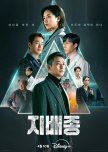
Crisp and tasty KDrama - revolving around some hot topics that one might rather want to call sci-fi
Intelligent, sharp, with strong characters. A crisp and tasty KDrama. “Blood Free” got me immediately - with an original hook, set within a gripping milieu, topped by thoughtful demeanor of interestingly authentic protagonists and splendid casting.Of course, the interfering natural interest of those in power (who obviously can never keep their hands off) is not at all surprising. Yet, the processing of some rather hot contemporary issues was presented in a refreshingly concise manner. Including topics that one might call a dream of the future... A bit far-fetched here and there? Perhaps. Nevertheless, often enough well grounded in common sense.
I assume there could as well be a second season... because the end doesn´t necessarily have to be the end, does it?
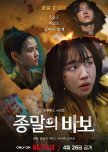
Slow paced & soulful slice of life - HOW we are living being more important than surviving
Beforehand: Anyone who expects "Goodbye Earth" to be a 12 episodes long doomsday blockbuster in the face of an impending apocalypse is completely wrong here. The KDrama has nothing to do with a fast-paced, action-packed and adrenaline-arousing desperate fight against an approaching asteroid.Plus: Yoo Ah-in's lead role, due to a charge of illegal drug use, was reduced to a minimum during production. So somehow it had to be improvised in terms of content. But in my opinion, a stronger focus on the female lead (played by Ahn Eun-jin) didn't hurt.
I would say "Goodbye Earth" is a ´slice of life´ centering around a bunch of rather ordinary people in a rather ordinary residential area in the city of Ungcheon. The remaining city population is expecting the crash of an asteroid that is on a collision course with the Earth and, according to calculations, will hit the Korean peninsula. Other than that, people live their lives - which, compared to before, obviously are not quite the same... So this dystopian KDrama is not about averting disaster. It's about continuing with life - until the end. Together. But, now, what do all the noble, dutiful, corrupt, holy, street-smart, arrogant, simple, life-hungry, in love, pregnant, believing and criminal variations of human beings do with this knowledge of their collective death?
Significantly, the looming asteroid isn't the worst thing at all in “Goodbye Earth”. In this particular scenario, the political order had already largely collapsed. Those who could afford it, had tried to save themselves. Eventually, the power vacuum was filled in no time. But fortunately, "Goodbye Earth" does not medially exploit the dystopian scenario to gleefully indulge into man's cruelty, unscrupulousness and insatiable greed even in the face of the bitter end. In fact, the KDrama gives its time and space mainly to interpersonal dynamics of a certain community - a diverse collection of people, young and old, who know each other from their community life, from school, from childhood. Only over time, little by little, in interspersed flashbacks, do we find out how they are all related to each other and what actually connects them. We walk along with them - during their last days, which are unstoppably shrinking in number… until the collision with the asteroid. Thus, emotionally, episode by episode, we get to know the people and their neighborhood better and might even grow fond of them, too.
The people in Ungcheon are actually less concerned with the approaching asteroid itself than with why and where their priest had disappeared or what had happened to the church money. And then there is this gang of criminals who among others specialized in child trafficking. The pain, fear and hopelessness felt by the people of Ungcheon is more likely to be caused by the collateral damages beforehand of the asteroid collision, than by actually facing their end.
It is slice of life in the context of a rather bizarre, extraordinary life situation. While people have to process their traumatic, crucial life experiences, talking and sharing might actually help to overcome emotional alienation or even frenzy. Yet... This is beautifully demonstrated in several examples. Sooner or later, close to the end the question arises as to what really counts...
In my opinion, this is a quietly gripping and complex KDrama. So complex that a few questions might remain unanswered at the end. But for me they are not so important here, therefore I can leave it at that. I´d say “Goodbye Earth” is rather about the personal processes that all those different characters have to go through, while dealing with those obviously extraordinary challenges their ordinary life is confronting them with.
For all those who expected e.g. “Deep Impact” in a series format, "Goodbye Earth" is certainly disappointing. For fans of slice of life, however, an almost unique scenario opens up in this rare dystopian context. The focus is on a former teacher who had to helplessly watch the children of her mid-school class becoming the greatest collateral damage in the run-up to the asteroid collision. For her this is representing the actual catastrophe.
"Goodbye Earth" lives from subtle interpersonal dynamics, coping with everyday life in a state of emergency and the daily struggles for emotional balance, for humanity and structure, for law and order in the midst of chaos. The KDrama is primarily a soulful and slow-paced study about the people of a neighborhood in Ungcheon bravely continuing with their lives in the light of their definitive collective death date. Because it's not over yet. Well aware about day X, life goes on. Until then. Together.
Bottom line: In the end, HOW we are living is more important, than surviving no matter what.
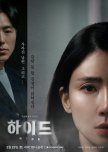
Dramaturgically opaque fabric of a multi-dimensional plot tapestry
At first glance, "Hide" is none of the spectacular KDrama productions, yet on the solid side of KDramas, I consider this production first class.We get an extremely complex crime thriller in which white-collar crime is intelligently mixed with many other criminal activities as well as incitement to and covering of criminal activities, plus fraud and adultery and even more. It is based on the Welsh television series “Keeping Faith” from 2018. However, the KDrama freely unfolds its own, definitely South Korean-tinged storyline. (There, of course, the Jaebeol shouldn't be missing, ...who, together with their henchmen, are significantly assigned the role which a gangster clan played in the Welsh series...)
“Hide” definitely offers a dramaturgically opaque fabric, where motives and entanglements reach beyond 'today', too. Continuously weaving surprising twists into the multi-dimensional plot tapestry turns out to be the great strength of “Hide”. Thanks to the entire production team in front of and behind the camera the story grippingly enfolds…and enfolds… and enfolds…
And in true KDrama-like style, no character remains one-dimensionally black or white - no matter how questionable or malicious they may act. Likewise, sooner or later we can relate to the motives of the different characters and why they were drawn into dishonest or even criminal actions. (Even if you don't have to approve of the actions, let alone like those characters.)
Complex. Dense. I would recommend this gripping crime thriller to fans of the genre, who like it with a topping of Korean emotionality.

What´s life if our heart threatens to tear? Emotionally intense KDrama. About crime&politics, too
“Wonderful World” is painting a wonderful psychological picture of people desperately trying to come to terms with their inner suffering. The focus is on feelings that we would rather not experience. Accordingly, the KDrama is anything but funny. This is once again a KDrama that isn't afraid of drama.What is life like when our heart threatens to tear? If someone is losing their child, for example... There is no stent nor bypass for that. Guilt and loss of control, the desolation of existence and sheer agony are shaping the terrain through which one has to survive every day. At best there is grieving. But to get there even, that is a long way... “Wonderful World” takes on these emotional dimensions – carefully, sensitively, seriously and urgently.
At the same time, this KDrama vividly documents how the selfish decision of individuals, who see themselves as elite or want to be seen as such, unscrupulously, ruthlessly and brutally throw the lives of 'insignificantly normal' people completely out of balance. It is thus a political drama about a world that is not as 'wonderful' as it claims to be, too.
“Wonderful World” is also a crime thriller because there is a murder to be solved. This brings tension and additional dynamism to the story. “Wonderful World” could also be understood as a story about one or two revenge missions. In my opinion, however, these are more stencils in the background. In the foreground unfolds the emotional world of those who feel left alone in their pain and their helpless anger - but still, they carry on, somehow. Two humans see and understand each other in their suffering and are/feel/come close to each other because of this ...and ultimately try to regain a sense of control over their lives. Therein lies the power and beauty of “Wonderful World” (I think anyways).
As I said, this KDrama is not afraid of drama. It's right in the middle of it and even better. The increase in entanglements, and the music, too, remind me in places of the early KDramas - and gladly so. A great script. Yes, bitter life experiences, admittedly. Nevertheless. Intense acting. Serious. Authentic.
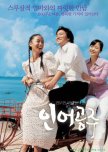
A little gemstone of its own kind
"My Mother, the Mermaid" is a KMovie gemstone. Old school it may be, however offering a sweet and empathic, yet down to earth (love) story without any polish, instead with a little bit of magic mixed in. Overall, the KDrama is ruthlessly rooted in the normality of a fairly simple (and also very South Korean) life.The most important about "My Mother, the Mermaid": A fantastic Jeon Do-yeon in her double role, a Go Doo-shim in top form, authentically rustic Haenyeo and Jejudo flair of the 1980s and the 'wonder´-ful story about a daughter, Na-young, getting to know more about her rather brash mother and her great love - Na-young's emotionally rather absent and ultimately disappeared father.
Sometimes there are worlds dividing (happy moments in the) past and (perhaps quite sad, desolate) present. But even if the present may now look completely different and happiness may seem to have long been lost, the happy, beautiful moments of the past somehow live on, well protected and guarded within the heart.
And sometimes we may evaluate a situation, a person or a relationship completely incorrectly or at least completely inadequately. Simply because we don't know everything yet...
The KMovie turns out to be an almost tender encouragement to approach life a little more humbly and calmly: Less judging and evaluating - because it kills the moment between here and now. Being open more often - because in doing so we give life a new chance with every moment.
-----------------------------------------------------------------------------
SIDE NOTE: --- On time, context and background ---
The KMovie from 2004 begins with a sequence that is set in the past during Asian crisis (late 1990s) - the son is inheriting his deceased father's debts... in that case however, his money mainly comes from his wife...
At first we can't understand why the mother insists so much that her large share of money she brought into the marriage was earned by herself and belonged to her, not him - and why it is so important to her that it was intended for her daughter's studies...
…The protagonist's mother was Haneyeo on Jejudo Island. These women of the sea – 'mermaids' – may not have had any formal school education in the past, but they always earned well because they dive for the sought-after, expensive seafood on the deep seabed and harvest it laboriously by hand with their spatulas. (Until today apparently only women can do this freediving job well.) The Haenyeo are people of respect on Jejudo, not least because of their financial independence. They are perhaps the only truly self-confident women in South Korea who are traditionally respected to this day and also have a naturally developed self-esteem as women (not just as potential wives!)...
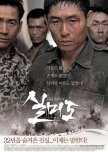
Secret SK military unit, drilled solely for assassinating Kim Il-sung, becoming victims of politics
“Silmido” is a KMovie that generated enormous public impact in South Korea. A 2003 production that used dramaturgical means to bring a previously unknown, small but rather blatant chapter of South Korean history to public awareness, that had long been kept secret and filed away. The KMovie “Silmido” had its mission fulfilled – at the box office, among the people and among those, who ultimately make decisions.“Silmido” was apparently more popular in South Korea than the Lord of the Rings trilogy or Titanic. To this day, the KMovie in South Korea is considered one of the most successful productions ever. The cast is first class. The focus is on the training camp for the secret military special unit 684 - its soldiers, its commanders, the training and living conditions. In the end we see where this all is leading to – this at that time particularly fatal involvement of the military with domestic and foreign policy, plus and foremost always at the forefront, yet hidden behind the curtain: the secret service.
The story is contrasting ambivalent attitudes towards feelings of national solidarity. On the one hand, an emotional patriotism based on the connection to one's personal origins and South Korean homeland, and on the other hand, a politically instilled national identity of “democratic South” against “communist enemy in the North”. On top of that: Unconditional obedience within the chain of command struggling with common sense...
Overall, it's about a brutal man´s military world. It is about hardline drilling methods. Yet , it is not about heroes and villains, nor about the good guys against the bad guys. Over time, the protagonists are increasingly gaining a profile, that shows some softer heartbeat, too. Camaraderie, bromance and respect for each other are in it as well. The showdown is rather disturbing.
PS:
Eventually the KMovie had its impact: in 2010, the central district court in Seoul ordered that the equivalent of around 188,000 euros in compensation should be paid out to the families of the former members of Unit 684 - the forgotten, denied unit that “Silmido” is about. The court comes to the conclusion after following public pressure and thus officially investigating the case: The Silmido soldiers had not been sufficiently informed about the hardship and dangers of the training camp, the training conditions had violated their basic human rights and the government at the time (1971) would have brought great suffering to the families of the bereaved by covering up the events.
---------------------------------------------------------
SIDE NOTE: --- Secret special Unit 684 ---
The film title "Silmido" refers to a very small, actually uninhabited island in the Yellow Sea, southwest of Incheon. Here (in response to the failed North Korean assassination attempt on South Korean President Park Chung-hee in 1968), between 1968 and 1971 a special military unit was trained at the instigation of the secret service, with just one goal: to eventually efficiently assassinate North Korean President Kim Il-sung. The circumstances surrounding Unit 684 are still not all clear. One thing is certain, though: the unit was created in April 68 (68-4) and trained in the utmost secrecy on the island of Silmido under almost inhumane conditions.
For the script quite some extensive research was done in advance. The story is based on rather thin officially existing information, added up with a few eyewitness reports, whereas gaps were filled with poetic freedom. For example, it is not clear how Unit 684 was actually recruited. However, among the specially trained elite soldiers there were obviously some with previous convictions, although not serious criminals. The KMovie ultimately decided to freely use a narrative that all the men were doomed criminals who, in their desperation without hope for an alternative future, had seized the last straw of becoming members of this particular secret unit.
The three years of elite training on Silmido had been extremely tough. Those who were not suitable simply did not survive the highly demanding torment. However, when the 31 soldiers were ready for deployment, the government decided to refrain from carrying out an assassination attempt and instead rely on a political solution for peaceful coexistence with the North. What had happened? US President Jimmy Carter hoped for a peaceful agreement. The South Korean policy followed that agenda, too. Accordingly, the head of the secret service was replaced by someone who also supported this peaceful approach. The link that was supposed to open a new dialogue between North and South was the Red Cross, not the military...
What may sound respectable, however, consequently led to the immediate disbandment of Unit 684. As of now, it officially should have never existed. Thus, 31 elite soldiers lost their right to exist. Their meaning and only goal for which they had lived (or rather survived) for the last 3 years, was trampled on... They were no longer useful, on the contrary: a disruptive factor. But politicians had made the calculation without the fighting machines they had specially drilled... this all led to a showdown in the outskirts of Seoul. As its result, however, Unit 684 went incorrectly down in history as a group of heavily armed communists... until 2003.
From 2010 onwards, it became finally official that actually those men were a South Korean secret elite military unit that had been drilled solely for the planned assassination of Kim Il-sung – until plans had changed at short notice for political reasons and some man in suits had decided to wipe out the life of 31 (in this context innocent) men in uniforms without any trace...
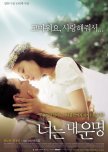
Magnificent balancing act of intense emotions. Old school production without high-gloss polish.
"You are my Sunshine" is the international title of this KMovie from 2005 - named after the US country song of the same name from the 1930s. However, the original title is "You are my destiny". Regardless, both are working. The Plot is based on a true story that happened in Yeosu around 2001.It's about prejudice. About the socially doubtful binding norm and where it is actually coming from. And it's about a man who, fortunately, cares less about what others say and trusts more in what he feels and believes is right. So this is about a positive role model of a man - a man who noticeably sets himself apart from the crowd who dominate the image of men here: Men who buy women, men who buy women abroad as wives, men who beat women without hesitation, men who infect women with AIDS (and don't tell them), men who won't let go of women, see them as possessions and unrestrainedly abuse them... There are the many completely 'normal', 'socially valued' men , husbands, fathers, whose behavior is simply outrageous. As if it were a matter of course, they set the standard of what is right, they set the tone... and yet deny any responsibility.
It's also about love. The sunny, courageous, positive message is embodied by a man who loves sincerely and unconditionally. However, he is generally considered naive. The cattle farmer is considered a hillbilly and a bit peculiar. Not just because he talks to his cow, but because he keeps the word he gave to the woman he loves and stands by what he feels. He is different. (Although, his attitude towards life, women, animals and nature could be considered quite progressive, too...)
And the woman? The female Protagonist could see herself as a victim. On top of that, she might be ashamed of her life. But despite everything that made her tainted and even 'leper' in her life as a prostitute, she was able to keep her soul pure inside. She is straight and clear, she doesn't deceive herself and above all she doesn't get her hopes up, because she knows life as it is - for women like her.
Life in the country is plain, ordinary, vulgar, simple. Also sensually grounded in the changing seasons. Although the ideal of pure, white skin is held high, the story instead focuses on the stigma of the tainted and tanned skin. The everyday scenario of bruises and violets from beating men as well as the darker Filipino and Vietnamese (versus light, pure South Korean) skin of purchased wives thematically dominate here. Finally, it´s about fear of AIDS (spots). That's the rural reality.
Nevertheless, there is this down-to-earth man who puts love above everything else – in good times and in bad... he´s honest, sincere, reliable, devoted, lovable. And there is this woman who can and wants to get involved... until her past catches up with her...
Two wonderful leading actors. Pure KMovie. Intense. Feels lifelike with a deep impact. A magnificent balancing act of conflicting emotions.
Old school production, though. Without high-gloss polish.

About a love that has somehow lost its suitability for everyday life over the years
“Between Him and Her” is an alternative to the tried and tested Cinderella love story, which usually ends with a supposedly “they lived together happily ever after”. Therefore, this story is about 7 years later...The KDrama is rather down-to-earth. It is set within the world of young creatives of Seoul´s fashion scene and tells about a love that has somehow lost its suitability for everyday life over the years. A love that became a habit.
Eventually, a critical moment causes the barrel of internal, unnamed, silent, consuming dissatisfaction to overflow and thus gives necessary strength to actually question everything. However, questioning everything also means having to ask yourself the unpleasant questions. Unfortunately, the answers are not clearly “yes” or “no”. They´re lurking subtly, are not always logical, nor pragmatic or even negotiable. Sometimes it's a "Yes. But." Sometimes it's a "No. But." The problem is: whether it's "yes" or "no", both are true. Love is not always automatically suitable for a partnership... and even if so, this cannot be considered a given either. Nevertheless, that doesn't make such a love any less true or valuable.
For outsiders, on the other hand, the matter may seem more evident. As a audience, we might want to shake one or the other. But in the end the answer unfolds exclusively from within the very personal, complicated emotional world of him and her. Nobody else can have a say. And the KDrama conveys that quite vividly, rather authentic and painfully realistic, too.
Accordingly, the pacing as the two protagonists are taking stock of their emotional relationship, is rather cautious and introspective. Therefore, subplots are providing some invigorating comedy and a bit of drama on the outside, thus pleasantly topping off this little study on certain facets about love.

unfathomable beastliness down to the blood. a search for the good guys could very well be in vain
You better be aware, it can always become more monstrous. For the audience, the first episodes of “The Escape of the Seven” are already quite inhospitable. Surely, among the protagonists one is worse than the other. We immerse ourselves in an unscrupulous world full of greed and devoid of any... …actually, I wanted to write "humanity", but then people also have a bitterly cruel and evil side, which is unfortunately also so very human in all its abysmal facets that it is painfully hurting and we'd rather not see it or let alone experience it... That's what "The Escape of the Seven" is about: The potency of human unscrupulousness... It couldn´t be more repulsive. (Could it?)Crass, brutal and soulless, but everything beautifully polished in HD – this is how the 'beautiful', (one would normally consider) ´desirable´ life of the "Seven" is displayed here. However, soon enough the limits of what is bearable are strained. Admittedly, at first I had to avert my gaze with a shudder. Pretty quickly I dropped this KDrama.
However, the job as a subtitler had me open up for a second attempt. Meanwhile – if I accept the premise: it's about a group of people who are entangled in their unscrupulousness, who are united in their monstrosity not least by their excessive greed and a disgusting obsession with money, power, prestige, rank and influence – I reconsider this KDrama quite original by now. Surely, there are lots of unsympathetic (and shockingly convincing so!) protagonists - that's downright provocative for a TV series entertainment mission. Nevertheless, eventually from the 5th episode onwards, the KDrama is unabashedly still gearing up. It´s like the point of no return. By then there´s no more escaping from “The Escape of the Seven”... You´re on the hook. Because you actually start hoping…(for ´the good´ to finally become true.)
The plot turns out to be a revenge mission cleverly disguised in several respects. AI and deepfakes on the one hand, tried-and-tested Makjang on the other inspire the psychopathic composition of a jungle full of fatal, dramaturgical entanglements. Intelligent, exciting, disturbing – more than once we might think we know what's going on and yet we're wrong. Ruthlessness is certainly one of the leitmotifs in this KDrama.
I only recommend "The Escape of the Seven" if the mood is right - one that demands unfathomable beastliness down to the blood. If we get involved in this KDrama, then we will uncompromisingly be catapulted into a world in which a search for the good guys could very well be in vain...
And there is a second season, too…
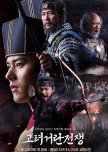
KDrama sure can do historical drama. Goryeo-Khitan War is another prime example of this
"Goryeo Khitan War" is a historical epic intended to honor not only the historically exceptional achievements during the Goryeo-Khitan War, but also half a century of KBS (Korean Broadcasting System). And it does. Perfectly done in all instances and scales. What's even more fascinating is how it succeeds to fill ca. 1,000 years long bygone history with life in a gripping way - close to the facts and colorfully embedded within the midst of the political milieu surrounding the royal court.If I hadn't accidentally stumbled into the filming set in the early summer of 2023, this thoroughly historical KDrama might have slipped a bit back on my list. But this personal connection eventually made me more curious. And now I'm full of praise.
32 hours long history lesson - history can be told so vividly… Complex personalities, an even more complex political context and a highly demanding challenge of war come very close to the audience. You don't have to be of Korean origin to be inspired - by its heart, intelligence, daring, perseverance and humanistic ethos. It is not about simply enumerating historic facts. It is colorful, complex, character driven – what happened about 1.000 years ago comes as close as it gets: Those years around the turn of the millennium at the beginning of the 11th century, when the 8th king of Goryeo - the then still quite young Hyeongjong of Goryeo - had to face the successive invasions of the numerically superior, Khitan of the Liao Dynasty.
What happened way back then obviously has happened a long time ago, but actually many policymakers today could be inspired and encouraged by the political attitude that is being exercised here. Even though facing the acute threat, this canny, courageous, responsible king isn´t willing to simply fly on sight, but rather acts cool-headed and with foresight. He is someone who does not shy away from complex, fundamental, unpopular, but far-reaching, forward-looking structural reforms... And then there is a government official, who not simply and opportunistically cares about himself, but about the cause - about the people, the country and the ´good´ (even if uncomfortable) decision.
The book "Sweet Rain in Winter" by Gil Seung-soo certainly contributed significantly to an excellent script. The historical greats, both large and small, impressively come to life. Romance is secondary, bromance is the theme here. By this I mean less the homosexuality of Mokjong, the 7th king of Goryeo. Rather, the intense struggle and relationship between King Hyeonjong and Gang Gam-chan, a scholar, government official, mentor of the king and crucial military commander during the third Goryeo invasion.
The KDrama offers a distinctively Korean (chapter of hi)story. One with a lot of pathos and even more ethos. One about people and their relationship dynamics, about their character strengths and weaknesses.
KDrama sure can do historical drama. Goryeo-Khitan War is another prime example of this.
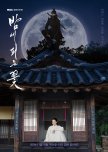
Cheeky, cheerful and heartfelt, drops of suspense included
“Knight Flower” is set in Joseon days, yet it is no epic, historical KDrama in a classical sense. It has endearing comedy to offer, the touch of a romance and even a touch of crime thriller, while the setting back then in Joseon is accounted for predominant neo-Cunfucian social ethics in those days. In particular, back then being widowed was bad news for women, whatsoever. (See side note). This circumstance is providing the hook for a cheeky and fresh-minded KDrama plot.In "Knight Flower", the widow simply cannot get herself to merely spending the rest of her long life in honorable, virtuous seclusion, mostly invisible to the rest of the world, trying not to be too much of a burden to her in-laws, and otherwise mourning the deceased husband (whom she never actually met) in the afterlife.
No, this widow does her own thing. She is not interested in being reduced to the virtue of mourning. During daytime, her everyday life is that of a honorable widow and decent daughter-in-law. Yet, at night she is dressed in black, wearing pants and a mask, climbing over walls, jumping over roofs and helping the poor – as "Midam", a kind of Robin Hood of Joseon. Such is her double life. All goes well, until one day...
While the plot is drawing its dynamic appeal from the actually rather sad background of a dubious tradition of treating widows (not only practiced in old Joseon, and not only back then…), the good news is: "Knight Flower", as a production broadcast in 2024, is built on intelligent emancipation, too. What is called for is not compliant bowing, but rather self-confident, creative solutions in dealing with life. Obviously South Koreans are craving for such a role model these days. The show was quite a success. People there apparently enjoyed it. So did I.
"Knight Flower" is cheeky, cheerful, and heartfelt, drops of suspense included, thus with alluring wit offering an enjoyably entertaining genre-mix.
------------------------------------------------------------
SIDE NOTE: --- Yeolnyeo or Yeolbu, the virtuous woman of Joseon ---
A loyal subject can only serve ONE king and a virtuous woman can only serve ONE husband. This perhaps briefly summarizes the core of the moral teachings of the period between the 14th century and the beginning of the 20th century. Practically speaking, this implied a widowed woman could face death penalty, if she ever wanted to marry again.
Women had to be obedient to their parents and in-laws. They had to honor their husband. And after his death the eldest son had the say... The greatest asset of a woman, besides bearing children, was her virtue. And that was eventually all that was left, if her husband might have died before herself. There was even granted an official award for valuing outstandingly honorable virtuous widows with the reputation of being a Yeolnyeo or Yeolbu. Thus they had to be particularly determined with living as a commendable model wife even after their husband´s death – according to all the rules regarding morals and daily routines as set out in detail in the book about good conduct for virtuous women…
However, the pressure on widows to be respected as Yeolnyeo became excessive over time. At some point it was even common for widows to consequently take their own lives, too, thus expressing their praiseworthy being loyal to the husband until the bitter end. In this way, they could posthumously provide their family (or that of their deceased husband) an honorable glory of virtue in which all family members could bask. Eventually, suicide was even expected of a widow – especially if she became a widow at a young age...

A bit weird and edgy, yet refreshingly and unashamedly honest about what love life also is like
"LTNS" (Long Time No Sex) starts off where other series usually end. TVING doesn't care about age ratings. “LTNS” is unusually explicit for a KDrama. At the same time, “LTNS” presents itself as a pitch-black comedy with venomously satirical overtones. Be prepared for an edgy series that is refreshingly and unashamedly honest about what love life also is like...If desire in a relationship has been turned off over time by habit and everyday worries while instead alienation and disinterest are creeping in... what should you do? The protagonists unexpectedly find an almost absurd option to bring some excitement and “we”-time back into their relationship. With detective zeal, they set out to blackmail those in whom the fire of (actually forbidden) desire still burns happily... and in doing so, they thus try to create a (almost criminal) virtue out of their own need, so to speak.
"LTNS" has fun with scenes that convey uninhibited sexuality one moment, but are completely unerotically thwarted the next. It is somehow down to earth in a most peculiar way. Bedroom stories are being told here that we haven´t been waiting for. All of a sudden such a certain mood for certain hours is eventually collapsing like a house of cards due to a mishap or unexpected incident... A "Bravo!" in this context to the actors, too!
“LTNS” promises a special kind of bizarre, weird series delight with plenty of potshots at the mendacity concerning certain facades of a solid and sincere love life and family life that are usually and preferably presented to the outside world.
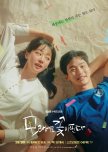
Sometimes grumpy & gruff, sometimes touchingly sweet & unabashedly sincere, radiating joy & warmth
“Like Flowers in Sand” is enchanting in its own way. Here we have once again a KDrama with a distinctive aura. Rustic, with tons of heart, original characters and great performance. Without tons of make-up, yet with plenty of bare male torsos - here, for a change, not focusing on aesthetic ideals… (which sort of makes this KDrama even more likeable and even more authentic.) Love also has a subtle hand in it here and conjures up a rather unconventional Rom+Com in the guise of a crime thriller.“Like Flowers in Sand” takes a look at the rural regions – with their living traditions, the lively gossip and the importance of lifelong childhood friendships. The way people interact with each other is a little rough, but still warm; sweet even, yet in a grumpy disguise.
The KDrama draws its significant charm from the tradition and lifestyle of the Ssireum wrestlers. The two protagonists grew up with Ssireum (see side note below). In general, Ssireum marks the dramaturgical pivot of the story - then and now.
The gym, the sand-filled wrestling field, the colorful ´satpas´, and the ML tirelessly running here and there and back again, all of this contributes to an unmistakable look&feel. In addition, "Like Flowers in Sand" is sometimes grumpy and gruff, sometimes touchingly sweet and unabashedly sincere - with three-dimensional, unconventional characters in their unique individuality quietly conquering the hearts of the audience. A KDrama solidly grounded in the life of ordinary people, that in its quirky, eccentric aura radiates joy and warmth.
----------------------------------------------------------------
SIDE NOTE: --- Ssireum – Korean version of wrestling ---
Ssireum has been listed as a UNESCO immaterial world heritage since 2018. This distinctive Korean wrestling is probably as old as the first kingdom of Korea itself, which according to legend was founded in 2333 BC. What is certain though, this form of wrestling has already been practiced during the time of the Goguryeo Kingdom. The strongest young men from the surrounding villages came together for competition, with the last man standing at the end being the winner.
Ssireum is the wrestling of two people within a circular field filled with sand with a diameter of 8 m. So-called 'satpas' form a kind of belt over the wrestling pants that the opponents at all cost hold on to during the fight - until one can bring the other down by strength or skill. The techniques are varied, but hitting and pushing are not among them.
Actually, previous to colonial times, this type of wrestling was known as Gakjo, Gakhi, Sangbak, Jaenggyo or Gakgi. Wrestling was tolerated under the Japanese because it had similarities to sumo. Competitions were successively sponsored, which ultimately led to national championships. To this day, Ssireum is an established and popular sport in South Korea being practiced by women, too.
Eventually, with Netflix broadcasting this ENA Production internationally, the immaterial cultural heritage is reaching more worldwide attention, too...
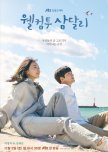
Pleasantly warming and inspiring, like a cup of tea that you may enjoy sip by sip
Once again a wonderfully authentic KDrama with amiable characters, who are living a live just like any South Korean life could be. The KDrama is neither captivatingly suspenseful nor does it urge to be devoured in one go. Instead, it's rather pleasantly warming and inspiring, like a cup of tea that you may enjoy sip by sip. The story could always go on as everyday life is - in Jejudo and elsewhere (in the province).At first glance, “Welcome to Samdal-ri” is a sweet Rom+Com and, in passing, it is also a declaration of love for Jejudo, the largest South Korean island. At second glance, however, the KDrama also delivers a lovingly drawn and yet time-critical image of society, in particular of a generation that is struggling to balance between archaic roots and home on the one hand as well as global, urban & digital lifestyle values on the other.
In general, lifelong friendship can be considered the overarching theme. The peer group as a family of choice in the sense of a community of fate, whose commitment has been growing from the inevitable spatial proximity of a village community - here: Samdal-ri.
Specifically, the story is about such a lifelong friendship between two friends, who at some point naturally became a love for life, yet without automatically being able to be lived as such.
As so often, it´s about family with its particular momentum, mingling as centrifugal and as pulling force, too.
Refreshing, soft and tangible: Shin Hye-sun and Ji Chang-wook. But overall, "Welcome to Samdal-ri" offers great casting in all positions.
Enjoy your tea time...
---------------------------------------------------------
SIDE NOTE...
...on "Welcome to Samdal-ri" offering a felicitous, good-humoured and optimistic time-critical image of society
On the one hand, the monotonous everyday life in the provinces just glides along. In “Welcome to Samdal-ri” the social tightness of the village structure is intensified by the island situation on Jeju-do. Binding village life in its everyday occurrences may be boring for some, while reliably familiar and pleasantly manageable for others. Rhythm, rules, community - everything is well-arranged. You can count on being safely caught by a social net that is protecting, warming. However, it comes with a price: a naturally intrusive social environment that would like to have a say everywhere...
On the other hand, the shimmering metropolis of distant Seoul is attracting the young with its wide world full of fashion, culture and lifestyle, promising individual fulfillment in a varied, anonymous, fast-paced, entertaining, colorfully inspiring, glittering city life that bears the stamp "successful". But this has its price, too, as the KDrama clearly shows with various examples. Fast-paced, cool big city life is mostly superficial, curt, nonbinding, aloof and mercilessly leaving you out in the cold.
Gossip apparently seems to be for us humans naturally coming with our anthropological cradle… Whether city or countryside, whether Seoul oder Samdal-ri, it is everywhere - the KDrama is cleverly using this as a dramaturgical bridge between the two worlds...
In a village with an intrusively curious neighborhood like Samdal-ri, where almost nothing can be kept secret, gossip adds spice to an otherwise uniform everyday life. However, it turns out, globalization and digitalization have by now raised village gossip to an unimagined, even more threatening (since anonymous) level. Rumors multiply virally in the form of social media posts shared at lightning speed, thus turning Seoul into just another (digital) village, yet on a global scale - with the effect that the brutal force of the impact far dwarfs that of a rural, analogue village. Once a rumor like this has started, it's hard to stop it and it's practically impossible to undo it. The anonymity of a viral rumor mill also invites hateful comments, the existential consequences of which no one seems to have to take responsibility for. Never mind whether there really is something to it or not… no one is interested anyway.
In the worst case, self-imposed exile from the analogue village offers an opportunity to escape social pressure at least. The digital village of the globalized new world, however, no longer shows any mercy. It's everywhere... there's no escape...
The uncontrollable social media with its enormous power as well as the largely non-binding, superficial encounters of an anonymous urbanity are juxtaposed with the archaic themes that continue to shape life on Jeju-do today - and thus the roots and grounding of its people. Eventually, "Welcome to Samdal-ri" tells of the dominance of tides and weather shaping everyday life; of the power of the sea, which continually takes its toll; of the lives of the Haenyeos diving for abalone and more - day after day, year after year; of the Haenyeo families, following the mother as the strong head of the family; and even of bloodguilt that turns friends into enemies, urging to pass this feud on from generation to generation.
Although life in the provinces may seem archaic, tight and boring, not everything automatically has to be wrong or bad. Nevertheless, young people increasingly and understandably prefer to go to Seoul. They want to leave the dusty roots and rigid structures behind. They prefer to live at the center of the vibrant new South Korean world instead.
But even if they leave their village home for individual fulfilment, psychologically they are still far from finding their way back to themselves. And even if Seoul has such a promising, almost magnetic, electrifying, cosmopolitan charisma, the capital, along with the temptations of big city life, also harbors a fatal seed, that many have not expected: Betrayal! Betrayal of oneself (and/or eventually betrayal of others...) For most people sooner or later this seed will be sprouting, if they lose their grounding along the way - if they simply radically cut off their roots instead of finding ways to continue to nourish them...
As such I appreciate "Welcome to Samdal-ri" offering way more than a Rom+Com - e.g. a felicitous, good-humoured and optimistic time-critical outlook on contemporary issues within modern society.
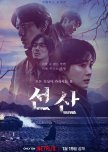
Slow paced. Gloomy. Solid crime thriller, set in a perhaps somewhat peculiar milieu
“The Bequeathed” is a dark and gloomy crime thriller that is set on the fringes of madness, obsession and shamanistic practices, taking place in a remote backcountry, where ordinary people have for generations been burying their dead under green burial mounds. It's not a horror story, but rather a solid, yet slow paced crime thriller, set in a perhaps somewhat peculiar milieu.There are only 6 episodes. Nevertheless, with only a little for the short time, comparatively much is revealed about a wildly mixed bouquet of different characters. A hodgepodge of astonishingly vividly drawn figures cross paths, take their space quite naturally and leave their traces with the audience. Against the background of the ongoing investigation into a series of murders, they all get the chance to clear up what they have (emotionally) left behind ... and move on.
I would not have expected this. Therefore I was positively surprised.
Authentic performance. Amazingly complex with haunting cinematic implementation. Dense. Suspenseful.
Nonetheless consistently gloomy. (It does get a little brighter towards the end though...)


 9
9 37
37 15
15


















